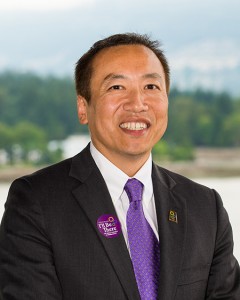As the International League of Dermatological Societies gathers in Vancouver this week, the Head of UBC’s Department of Dermatology and Skin Science will be officially installed as the organization’s president.
Harvey Lui will be formally ratified as the ILDS’s leader at the World Congress of Dermatology, a quadrennial event expected to draw up to 12,000 participants.
“I am very humbled to be given the responsibility to do this,” Dr. Lui, who lobbied to bring the World Congress to Vancouver, told the The Chronicle of Skin & Allergy. “I have a deep sense of pride as a Canadian to be given the privilege of leading this organization.”
Canadians sometimes doubt their ability to make an impact on the world stage, he says, but Canadian physicians and researchers have made tremendous contributions to dermatologic science.
“So I feel that, personally, this is my responsibility and my opportunity to give back to a specialty and a community in Canada and at the global level that has really helped me to do the things that I thought were important in dermatology,” Dr. Lui told The Chronicle of Skin & Allergy.
The World Congress was last held in Seoul. In addition to Dr. Lui, a key actor in bringing the event to Vancouver was Stuart Maddin, a Clinical Professor Emeritus who died May 21 at the age of 94. Dr. Maddin’s most recent book on the international heroes of dermatology will be officially launched during the World Congress.
The 23rd World Congress will feature several research presentations by UBC faculty members and students, including:
- Professor Jan Dutz, the only Canadian speaking at a plenary session, will discuss the skin’s potential in enhancing the efficacy of vaccines administered topically.
- Graduate student Zhenguo Wu, Professor Haishan Zeng and others from UBC will explain their new laser technology for capturing “vertical” images of the skin, revealing details below the surface in a non-invasive manner.
- Clinical research fellow Vincent Richer will describe his comparison of the visibility of different sunscreens, which could be a major factor in determining whether people apply enough of it.
- Medical student Pavandeep Gill will reveal whether it’s feasible for Canadians to get enough sunlight to enable their bodies to synthesize Vitamin D. (Short answer: No.)
As President of the ILDS, Dr. Lui will coordinate the activities of the group’s 157 member organizations, including providing a forum for the sharing of information about dermatology on an international scale, he says. During his four-year term, Dr. Lui also hopes to foster engagement between physicians and the ILDS beyond the World Congress of Dermatology gathering every four years.
“An individual dermatologist doesn’t join as a member of the ILDS,” Dr. Lui told The Chronicle of Skin & Allergy. “But that doesn’t mean that an individual can’t have a relationship with the ILDS and understand what its goals and objectives are, and contribute to it. The analogy I use is that it is like the World Health Organization (WHO). Countries are members of the WHO, not individual citizens. However, citizens of the world recognize what the WHO is, they contribute to it, they are aware of it, and it is a very vital organization in the world. That’s the same kind of thing I want to achieve for ILDS. To get people to really understand that between these World Congresses, there is a lot of activity happening at the international level by a number of different organizations—especially the ILDS.”
The ILDS also represents dermatology at the level of international commissions and health organizations, including being the only organization devoted to dermatology in the world that has an official relationship with the World Health Organization.
Dr. Lui hopes to emphasize the disparity of dermatologic care in the world. While the leading edge of research is unlocking new and better treatments all the time, “we have countries and places in the world that can’t even access simple, basic dermatologic care.” Conditions such as scabies, which is considered a nuisance parasitic infection in the developed world, is a major cause of suffering and economic burden elsewhere, he says.
The ILDS will also continue to champion humanitarian causes, such as the Regional Dermatology Training Centre in Tanzania, the International Alliance for the Control of Scabies, and support for persons with albinism, through the International Foundation for Dermatology (IFD), which was established to improve the management of skin disease in underserved areas of the world. The IFD will be hosting sessions and displays throughout the World Congress.

